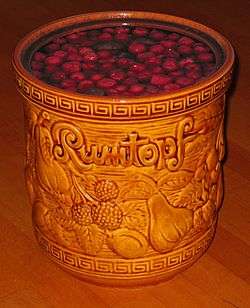Rumtopf
 | |
| Course | Dessert |
|---|---|
| Place of origin | Germany and Denmark |
| Main ingredients | Fruit, rum, sugar |
|
| |
Rumtopf (Danish: Romkrukke), which literally means rum pot, is a German and Danish dessert, traditionally eaten around Christmas.[1] Once a popular traditional dessert, Rumtopf had fallen in fashion by 2004.[2]
A mixture of various kinds of fruit, high-strength rum, often Stroh's, and sugar is filled into a large stoneware pot (the eponymous rum pot) and matured for several months until the fruit is very soft and completely saturated with rum. Suitable fruit includes berries, cherries, plums and apricots. Not all fruits are appropriate for Rumtopf, and the overproof rum should be of only 100-110 proof (50-55% alcohol by volume), which is not commonly available at retail in all regions, but can be prepared by blending more common commercially available 151 proof and 80 proof rums.[3][4][5]
Traditionally, the pot is set up in a cool and dark place in Spring, and different kinds of ripe fruit are added to it over the months as they come in season. The fruit is thereby preserved to be eaten in Winter, when the Rumtopf is matured.
Rumtopf may be served with ice cream, waffles or Bratapfel (baked apples).
See also
- List of dessert sauces
- List of German desserts
-
 Food portal
Food portal
References
- ↑ Clark, Melissa (September 21, 2010). "Spiking Summer Fruit in Order to Preserve It". The New York Times. Retrieved September 22, 2010.
- ↑ Nadia Hassani (2004). Spoonfuls of Germany: Culinary Delights of the German Regions in 170 Recipes. Hippocrene Books. pp. 60–. ISBN 978-0-7818-1057-9. Retrieved August 26, 2013.
- ↑ "Rumtopf (rum pot) Recipe". GermanDeli.com. Retrieved February 23, 2014.
- ↑ McGavin, Jennifer. "How and When to Make Rumtopf Fruit". About.com German Food. Retrieved February 23, 2014.
- ↑ "Rum Pot or Rumtopf". My Best German Recipes. Retrieved February 23, 2014.